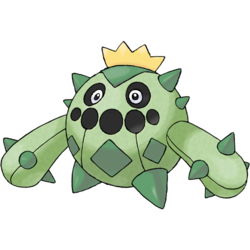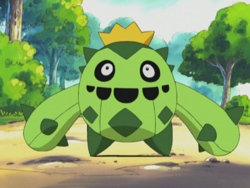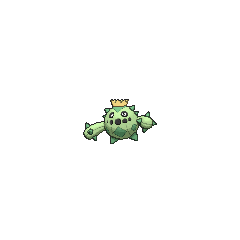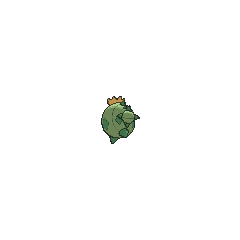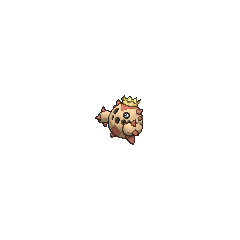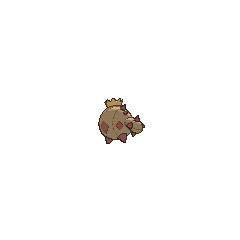From Bulbapedia, the community-driven Pokémon encyclopedia.
Cacnea (Japanese: サボネア Sabonea) is a Grass-type Pokémon.
It evolves into Cacturne starting at level 32.
Biology
Cacnea is a green, bipedal Pokémon with a round body and cactus-like striations. It has a dark green rhombus shape above its face, and six dark green rhombus shapes that ring around its waist. It has dark circles around its eyes, and its mouth composed of several similar circles. It has two dark green spikes on each side of its head, along with a yellow flower bud on top of its head. Its two club-like arms that are ringed with dark green spikes, and its two stubby, legs are dark green and conical.
Cacnea uses its thorny arms like hammers to attack its opponents. The thorns allow it to use its former signature move, Needle Arm. It is able to live in deserts for 30 days without any water, due to its body being able to store moisture. The beauty of its yellow flower depends on the harness of its environment. This flower releases a strong aroma to attract prey. When prey approaches, Cacnea shoots sharp thorns to bring it down.
In the anime
Major appearances
Cacnea first appeared in A Poached Ego. It became James's Pokémon after his Weezing and Jessie's Arbok left to protect a bunch of Ekans and Koffing that were freed from a Pokémon Poacher. In Once There Were Greenfields, James gave Cacnea to Gardenia in order to master Drain Punch.
Minor appearances
Pokédex entries
In the manga
In the Pokémon Adventures manga
Cacnea first appears in the very first round of the Ruby and Sapphire chapter, Creeping Past Cacnea.
In the TCG
- Main article: Cacnea (TCG)
In the TFG
One Cacnea figure has been released.
Game data
Pokédex entries
| This Pokémon was unavailable prior to Generation III.
|
| Generation III
|
|
| Ruby
|
Cacnea lives in arid locations such as deserts. It releases a strong aroma from its flower to attract prey. When prey comes near, this Pokémon shoots sharp thorns from its body to bring the victim down.
|
| Sapphire
|
The more arid and harsh the environment, the more pretty and fragrant a flower Cacnea grows. This Pokémon battles by wildly swinging its thorny arms.
|
| Emerald
|
Cacnea live in deserts with virtually no rainfall. It battles by swinging its thick, spiked arms. Once a year, a yellow flower blooms.
|
| FireRed
|
It prefers harsh environments such as deserts. It can survive for 30 days on water stored in its body.
|
| LeafGreen
|
|
|
| Generation IV
|
|
| Diamond
|
By storing water in its body, this desert dweller can survive for 30 days without water.
|
| Pearl
|
| Platinum
|
| HeartGold
|
It lives in arid locations. Its yellow flowers bloom once a year.
|
| SoulSilver
|
|
|
| Generation V
|
|
| Black
|
By storing water in its body, this desert dweller can survive for 30 days without water.
|
| White
|
| Black 2
|
By storing water in its body, this desert dweller can survive for 30 days without water.
|
| White 2
|
|
|
| Generation VI
|
|
| X
|
It lives in arid locations. Its yellow flowers bloom once a year.
|
| Y
|
It prefers harsh environments such as deserts. It can survive for 30 days on water stored in its body.
|
| Omega Ruby
|
Cacnea lives in arid locations such as deserts. It releases a strong aroma from its flower to attract prey. When prey comes near, this Pokémon shoots sharp thorns from its body to bring the victim down.
|
| Alpha Sapphire
|
The more arid and harsh the environment, the more pretty and fragrant a flower Cacnea grows. This Pokémon battles by wildly swinging its thorny arms.
|
|
|
Game locations
| This Pokémon was unavailable prior to Generation III.
|
|
|
|
|
|
|
|
|
In side games
| This Pokémon was unavailable prior to Generation III.
|
|
|
|
|
|
|
In events
Held items
Stats
Base stats
| Stat
|
Range
|
| At Lv. 50
|
At Lv. 100
|
50
|
|
110 - 157
|
210 - 304
|
85
|
|
81 - 150
|
157 - 295
|
40
|
|
40 - 101
|
76 - 196
|
85
|
|
81 - 150
|
157 - 295
|
40
|
|
40 - 101
|
76 - 196
|
35
|
|
36 - 95
|
67 - 185
|
Total: 335
|
Other Pokémon with this total
|
- Minimum stats are calculated with 0 EVs, IVs of 0, and (if applicable) a hindering nature.
- Maximum stats are calculated with 252 EVs, IVs of 31, and (if applicable) a helpful nature.
|
Pokéathlon stats
Type effectiveness
| Under normal battle conditions in Generation IX, this Pokémon is:
|
|
|
|
|
|
|
|
|
|
|
|
|
Learnset
|
|
|
|
- Bold indicates a move that gets STAB when used by Cacnea
- Italic indicates a move that gets STAB only when used by an Evolution of Cacnea
- Click on the generation numbers at the top to see level-up moves from other generations
|
|
|
|
|
- Bold indicates a move that gets STAB when used by Cacnea
- Italic indicates a move that gets STAB only when used by an Evolution of Cacnea
- Click on the generation numbers at the top to see TM moves from other generations
|
|
|
|
|
- Moves marked with an asterisk (*) must be chain bred onto Cacnea in Generation VI
- Moves marked with a double dagger (‡) can only be bred from a Pokémon who learned the move in an earlier generation.
- Moves marked with a superscript game abbreviation can only be bred onto Cacnea in that game.
- Bold indicates a move that gets STAB when used by Cacnea
- Italic indicates a move that gets STAB only when used by an Evolution of Cacnea
- Click on the generation numbers at the top to see Egg moves from other generations
|
|
|
|
|
- A black or white abbreviation in a colored box indicates that Cacnea can be tutored the move in that game
- A colored abbreviation in a white box indicates that Cacnea cannot be tutored the move in that game
- Bold indicates a move that gets STAB when used by Cacnea
- Italic indicates a move that gets STAB only when used by an Evolution of Cacnea
- Click on the generation numbers at the top to see Move Tutor moves from other generations
|
Side game data
Evolution
Sprites
| This Pokémon was unavailable prior to Generation III.
|
|
|
|
|
|
|
|
|
Trivia
Origin
Cacnea is based on a barrel cactus and possibly from a jack-o'-lantern.
Name origin
Cacnea may be a combination of cactus and its Japanese name.
Sabonea may be a combination of 仙人掌 saboten (cactus) and debonair.
In other languages
| Language
|
Title
|
Meaning
|
 Japanese Japanese
|
サボネア Sabonea
|
From 仙人掌 saboten and debonair
|
 French French
|
Cacnea
|
Same as English name
|
 Spanish Spanish
|
Cacnea
|
Same as English name
|
 German German
|
Tuska
|
From Kaktus
|
 Italian Italian
|
Cacnea
|
Same as English name
|
 Korean Korean
|
선인왕 Seon-in-wang
|
From 선인장 (仙人掌) seon-in-jang and 왕 (王) wang; literally "Cactus King" or "Kingtus"
|
 Mandarin Chinese Mandarin Chinese
|
沙漠奈亞 / 沙漠奈亚
Shāmònàiyǎ / Shāmònàiyà
|
From 沙漠 shāmò and 奈亞 nàiyǎ
|
 Cantonese Chinese Cantonese Chinese
|
|
|
|
|
|
|
|
|
|
Related articles
External links

|
This Pokémon article is part of Project Pokédex, a Bulbapedia project that aims to write comprehensive articles on each Pokémon species, as well as Pokémon groups and forms.
|
 For other sprites and images, please see Cacnea images on the Bulbagarden Archives.
For other sprites and images, please see Cacnea images on the Bulbagarden Archives.


